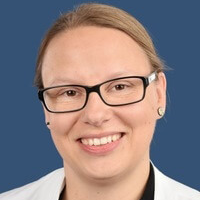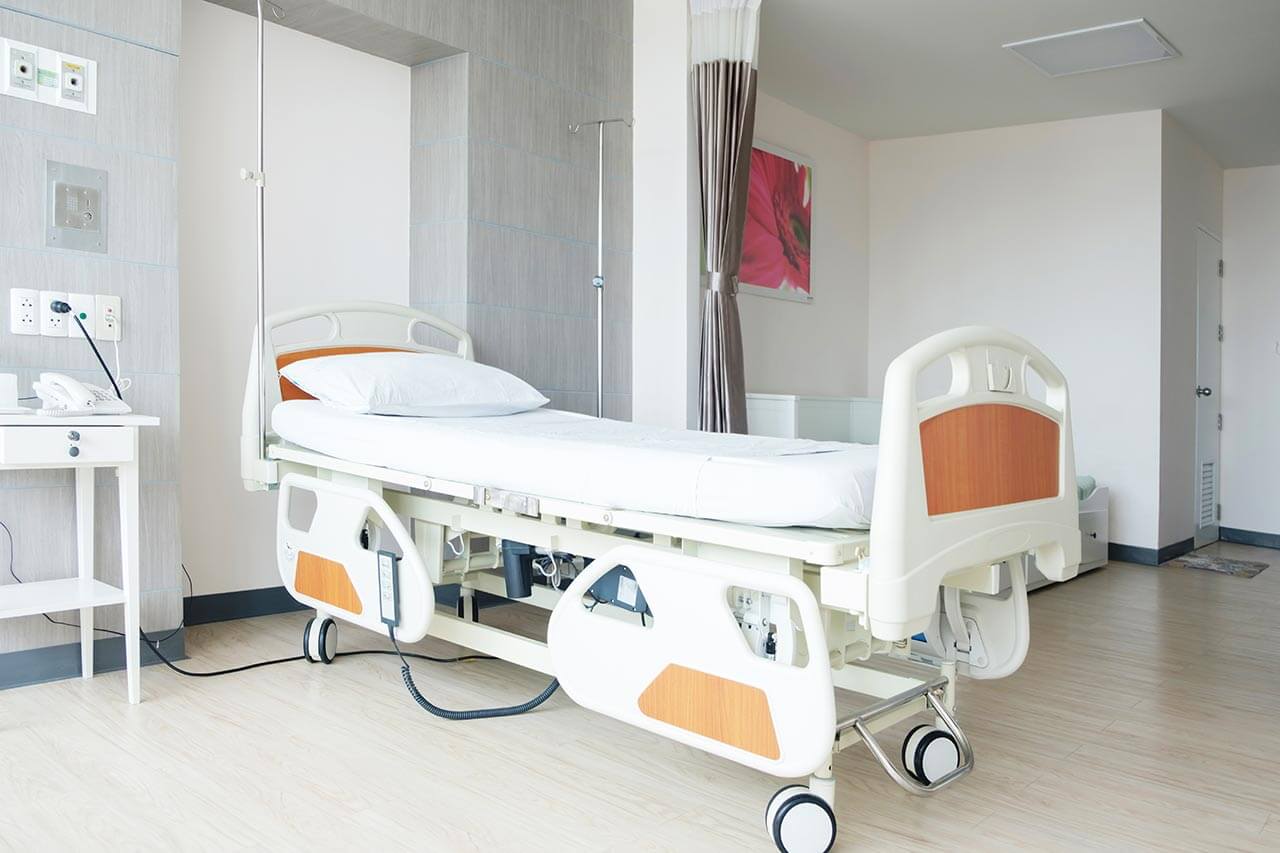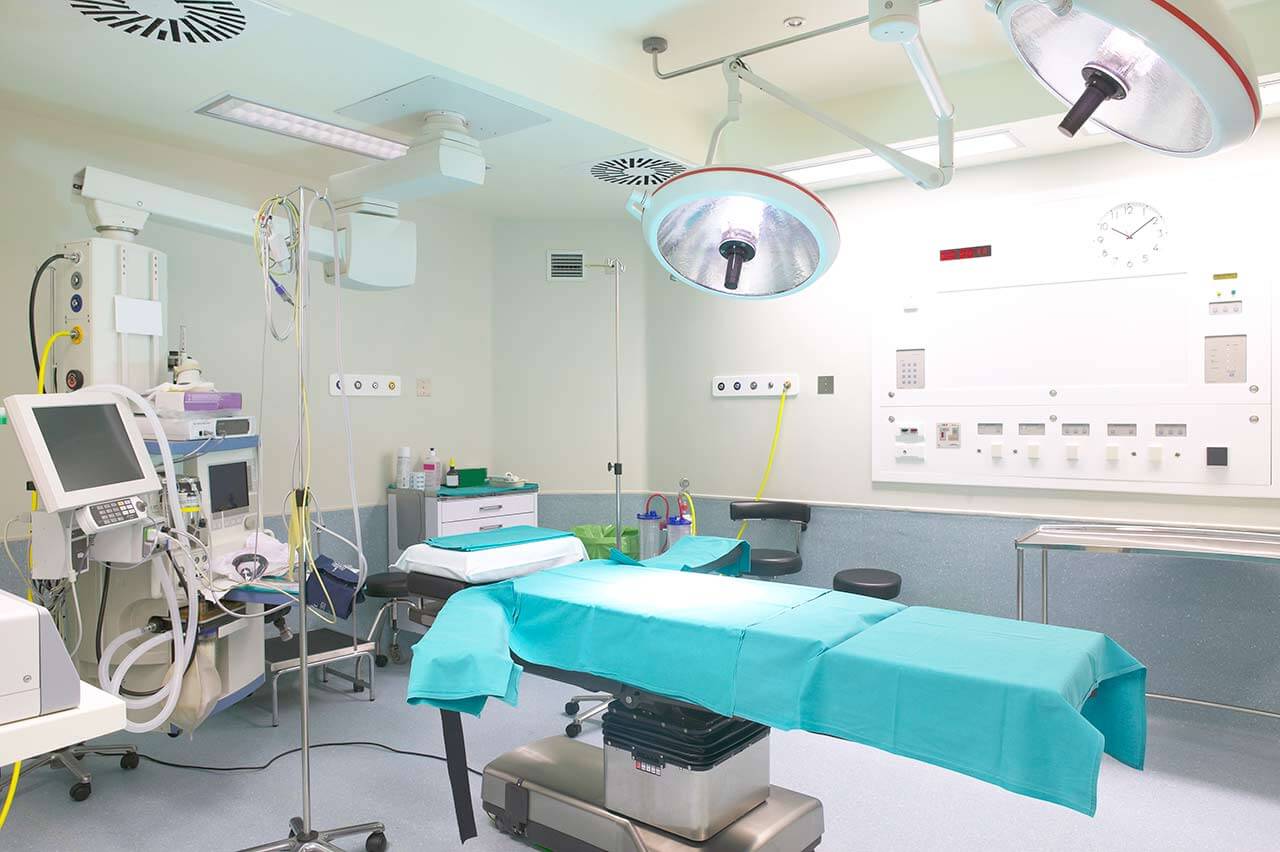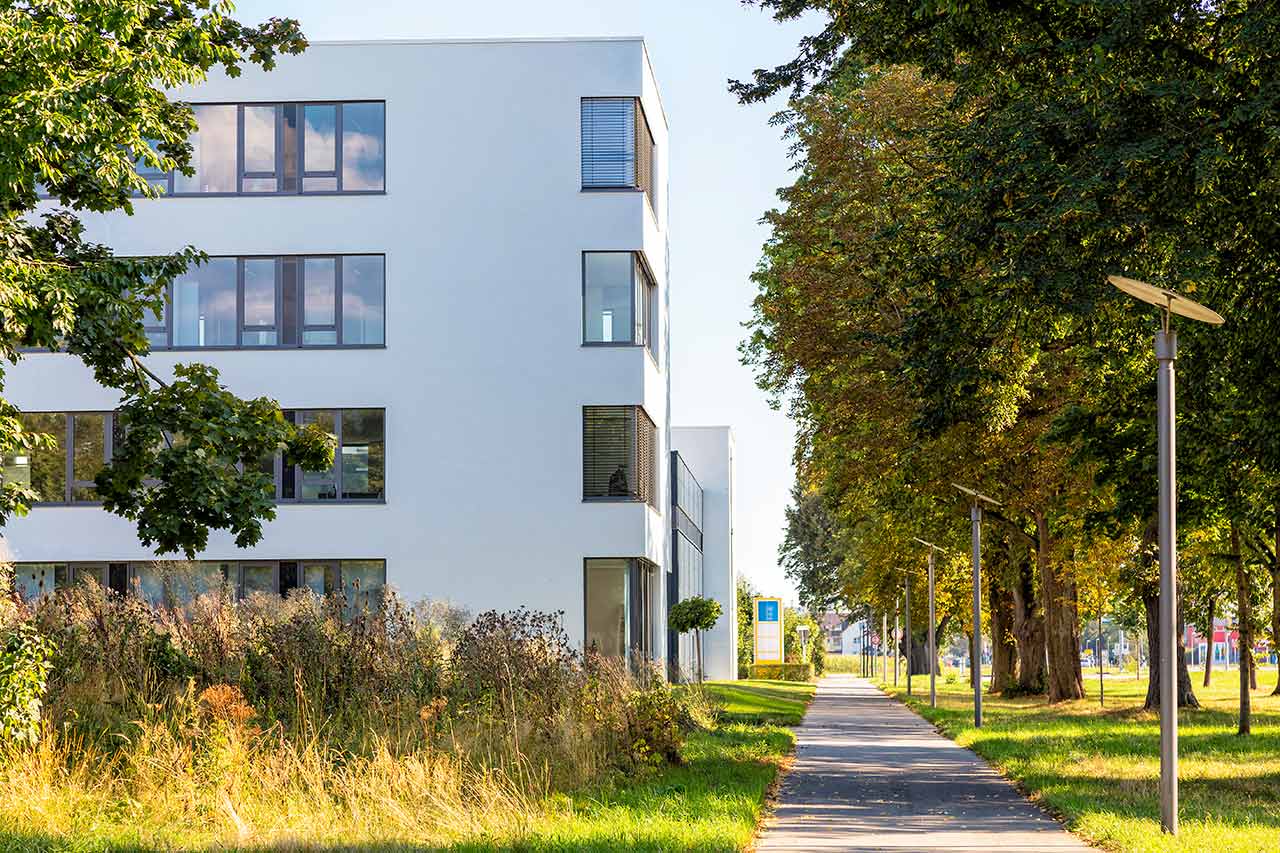
The program includes:
- Initial presentation in the clinic
- clinical history taking
- review of medical records
- physical examination
- laboratory tests:
- complete blood count
- general urine analysis
- biochemical analysis of blood
- TSH-basal, fT3, fT4
- tumor markers
- inflammation indicators (CRP, ESR)
- indicators of blood coagulation
- abdominal ultrasound scan
- CT scan/MRI or PET-CT of abdomen
- preoperative care
- cytoreductive surgery to remove visible tumors
inside the abdomen and HIPEC - histological and immunohistochemical
examination of removed tissues - symptomatic treatment
- cost of essential medicines
- nursing services
- stay in the hospital with a full board
- accommodation in a 2-bedroom ward
- elaboration of further recommendations
How program is carried out
During the first visit, the physician will conduct a clinical examination and go through the results of the available diagnostic tests. After that, you will undergo the necessary additional examination, such as the assessment of liver and kidney function, ultrasound scan and tomography of the abdominal organs. Based on the results of the examination, the physician will choose the surgical technique and the type of anesthesia. After that, preparation according to the preoperative standard will start.
Cytoreductive surgery begins with general anesthesia. The intervention is performed as open surgery, i.e. through the incision in the anterior abdominal wall, so that the surgeon can carefully examine the peritoneum and the surface of the abdominal organs. The surgeon removes affected by the malignant process ovaries, areas of the peritoneum and metastases in other internal organs. This stage of the operation can take several hours, since the overall effectiveness of the treatment depends on the completeness of the malignant tissues removal.
At the next stage of the operation, the surgeon inserts several catheters into the abdominal cavity. Through the catheters, a heated solution of a chemotherapy drug is pumped inside. The special system maintains the required temperature (42-43 degrees Celsius), pressure and circulation rate of the medicinal solution. The solution mechanically flushes out blood clots and remnants of malignant tissues, and a heated chemotherapy drug destroys micrometastases in internal organs and lymph nodes (micrometastases can’t be detected by the naked eye).
After 1-1.5 hours, the chemotherapy drug is removed from the abdominal cavity and the abdominal cavity is washed with saline. After that, the surgeon removes the catheters and sutures the incision of the anterior abdominal wall.
After the completion of the operation, you will be transferred to the ward of the intensive care unit, under the round-the-clock supervision of doctors and nurses. In 1-3 days after the operation, your drains will be removed and you will be transferred to a regular ward for further recovery. The whole treatment takes 10-12 days on average.
Finally, the attending physician will evaluate the results of control examinations, schedule the date of discharge from the hospital and give you detailed recommendations for further follow-up and treatment.
Required documents
- Medical records
- MRI/CT scan (not older than 3 months)
- Biopsy results (if available)
Service
You may also book:
 BookingHealth Price from:
BookingHealth Price from:
About the department
The Department of Gynecology, Mammology and Obstetrics at the Prosper Hospital Recklinghausen offers high-precision diagnostics and comprehensive treatment of diseases of the reproductive organs and breast pathologies in women. The department's key focus is the treatment of breast cancer and urinary incontinence. The team of gynecologists is also particularly interested in the treatment of malignant diseases of the female reproductive system, such as cervical cancer, uterine cancer, ovarian cancer, and vulvar cancer. The department is the only Gynecologic Cancer Center certified by the German Cancer Society (DKG) in Recklinghausen. Sparing minimally invasive and robot-assisted da Vinci surgery is widely used in the department's clinical practice. These techniques are innovative in modern surgery and allow doctors to perform gynecologic surgery with only a few small skin incisions. The department's gynecologists treat more than 4,000 patients every year, with about 2,800 of them undergoing treatment on an inpatient basis. The department also offers integrated management of pregnancy at all stages, including high-risk pregnancies, safe childbirth, and postpartum care. More than 900 babies are born here every year. The department is headed by Dr. med. Nina Herrmann.
The department's gynecologists are highly professional in the treatment of benign and malignant diseases of the female reproductive organs. The most common benign pathologies in the department's clinical practice are uterine fibroids, benign ovarian tumors, endometriosis, cervical dysplasia, and genital warts. To treat these pathologies, the department's medical team has an impressive arsenal of techniques such as classical, robot-assisted, and minimally invasive surgical interventions, as well as advanced laser procedures. For example, the department removes uterine fibroids using da Vinci robot-assisted surgery. The robotic surgical device consists of several "slave manipulators", which serve to perform all kinds of surgical maneuvers. One of them holds a tiny video camera, thanks to which a high-resolution 3D image is displayed on a large screen so that the surgeon can clearly see the operating field. The thinnest surgical instruments are fixed to the rest of the "slave manipulators". When performing the operation, the surgeon is sitting at a special control console, which he uses to give commands to the robot. Endoscopic instruments follow the movements of the surgeon's hands with millimeter precision, thereby avoiding serious damage to healthy tissue. The robot-assisted interventions eliminate the need to resect the anterior abdominal wall, as in classical open surgery, which promotes early postoperative recovery and minimal pain in the postoperative period. In addition, robot-assisted surgery excludes damage to the bladder, so the patient will not experience any problems with urination, which may sometimes arise after open interventions.
The treatment of malignant tumors of the female reproductive system, such as endometrial cancer, uterine cancer, cervical cancer, ovarian cancer, and vulvar cancer, is a more complex clinical task and requires an interdisciplinary approach of specialists from several related fields. The department's specialists hold weekly tumor boards with the participation of oncologists, radiation therapists, chemotherapists, radiologists, and other doctors. The treatment regimen for cancer of the female reproductive system is developed exclusively on an individual basis, taking into account the patient's needs and wishes. The department offers advanced treatment methods that can effectively cure gynecological cancers of various stages. If clinically indicated, patients suffering from uterine and cervical cancer can undergo sparing robot-assisted interventions using the da Vinci surgical system. The lymph nodes can also be removed using robotic intervention. In case of cancers of other internal and external female reproductive organs, the department's gynecologists have to resort to open surgery. After the operation, the patients are under close supervision in a modern Intensive Care Unit, and also undergo follow-up treatment, which may include chemotherapy, radiation therapy, antibody therapy, etc.
Another important focus of the department's gynecologists is the treatment of urinary incontinence and pelvic organ prolapse in women. In this medical field, gynecologists cooperate closely with specialists in urology and coloproctology. Thus, patients can undergo interdisciplinary diagnostics and receive optimal therapy. The department specializes in the treatment of all forms of urinary incontinence and offers each patient an individual treatment plan, taking into account her clinical case. The therapeutic options include both conservative and surgical techniques. Conservative treatment methods for urinary incontinence include therapeutic exercises to strengthen the pelvic floor muscles, biofeedback, pessaries, electrical stimulation, etc. If these methods do not yield any positive results, the doctors will have to resort to surgical treatment. Most surgeries for urinary incontinence are performed using sparing minimally invasive techniques. The specialists mostly perform TVT and TVT-O sling procedures. In cases of pelvic organ prolapse, patients undergo such operations as Amreich-Richter sacrospinous fixation, anterior and posterior vaginoplasty with removal or preservation of the uterus, and plastic surgery using biocompatible plastic meshes.
The department's team of breast specialists focuses on breast cancer treatment. The therapy complies with the guidelines of the German Cancer Society, the Working Group on Gynecologic Oncology, and the recommendations of the European Society of Breast Cancer Specialists (EUSOMA). The department offers advanced medical equipment for comprehensive breast cancer diagnostics, including digital mammography, high-resolution 3D and 4D ultrasound scanning, MRI, and all types of breast biopsy. Once the doctor makes an accurate diagnosis and determines the stage of the pathology, he will prescribe the optimal treatment regimen, which is mostly based on a surgical intervention. In many cases, the department's breast specialists manage to preserve the breast. If the disease has an advanced stage and breast removal is required, the patient will be offered follow-up plastic reconstructive surgery to restore the breast and maintain an attractive appearance. An integral part of therapy is also psycho-oncological support aimed at developing a positive attitude towards treatment.
A highly professional team of obstetricians and gynecologists takes care of the integrated management of pregnancy and the comfortable course of childbirth. The specialists have vast clinical experience to ensure safe childbirth to the expectant mother. Preference is given to natural childbirth, taking into account the needs and wishes of expectant mothers. If necessary, a C-section is performed in a state-of-the-art operating room adapted to this type of operation. There is also the possibility of giving birth in water. Due attention is paid to pain relief during childbirth, for example, using relaxation baths, homeopathy, acupuncture, drugs, etc.
The department's clinical focuses include:
- Gynecology
- Diagnostics and treatment of malignant diseases of the female reproductive system
- Surgical treatment
- Organ-sparing surgery for precancerous conditions
- Robot-assisted surgery using the da Vinci robotic system for uterine and cervical cancers, including a lymphadenectomy
- Classical and minimally invasive surgery for endometrial, cervical, ovarian, vulvar, and vaginal cancers
- Conservative treatment
- Chemotherapy
- Radiation therapy
- Antibody therapy
- Hormone therapy
- Immunotherapy
- Surgical treatment
- Diagnostics and treatment of benign diseases of the female reproductive system
- Laparoscopy for the surgical treatment of uterine and ovarian diseases: cysts, fibroids, tumors, endometriosis, and inflammatory and adhesive processes
- Laparoscopy for an ectopic pregnancy (with fallopian tube preservation, if possible)
- Laparoscopy for the removal of the uterus and/or ovaries
- Removal of the uterus and/or ovaries through the vagina or a small transverse incision in the lower abdomen (in cases of contraindications to laparoscopic or robot-assisted surgery)
- Removal of fibroids with preservation of the uterus or surgical treatment of ovarian pathology through a small transverse incision in the lower abdomen (in cases of contraindications to laparoscopy)
- Therapeutic endoscopy for uterine diseases: bleeding, fibroids, and polyps
- Dilation and curettage for bleeding (to preserve the uterus)
- Robot-assisted surgery using the da Vinci surgical system for fibroids, adhesions, and pelvic organ prolapse, including surgical removal of the uterus and/or ovaries
- Laser treatment of genital warts on the external genitalia
- Surgery for urinary incontinence
- TVT and TVT-O sling procedures
- Burch colposuspension
- Surgery for pelvic organ prolapse
- Corrective surgery for uterine and/or vaginal prolapse
- Anterior and posterior vaginal plastic surgery with and without a hysterectomy
- Amreich-Richter procedure for pelvic organ fixation
- Pelvic organ fixation using laparoscopy or the da Vinci surgical system with the implantation of a biocompatible plastic mesh
- Pelvic floor muscle reconstruction in cases of recurrent prolapse using the method of implanting biocompatible plastic meshes
- Diagnostics and treatment of malignant diseases of the female reproductive system
- Mammology
- Diagnostics and treatment of breast cancer
- Surgical treatment
- Organ-preserving surgery, including methods of oncoplastic surgery using autologous tissues to close defects
- Classical techniques for lymph node removal in the armpit
- Breast removal and its immediate reconstruction
- Breast reconstruction with autologous tissues or implants
- Breast reduction or augmentation after tumor resection
- Nipple reconstruction surgery
- Conservative treatment
- Chemotherapy
- Radiation therapy
- Antibody therapy
- Hormone therapy
- Immunotherapy
- Surgical treatment
- Aesthetic plastic surgery for breast augmentation or reduction
- Corrective interventions for breast asymmetry or deformities
- Diagnostics and treatment of breast cancer
- Obstetrics
- Integrated management of pregnancy
- Childbirth: natural childbirth, water birth, and C-section
- Pain management: homeopathy, acupuncture, analgesic drug therapy, relaxation baths, etc.
- Postpartum care for mother and baby
- Other medical services
Photo of the doctor: (c) Prosper-Hospital Recklinghausen
About hospital
According to the prestigious Focus magazine, the Prosper Hospital Recklinghausen ranks among the top medical facilities in North Rhine-Westphalia!
The hospital enjoys the status of a modern medical complex with the highest standards of care and a long history of more than 175 years. The health facility is an academic hospital of the Ruhr University Bochum, which provides unimpeded access to medical innovations. With 530 beds, the hospital is known as the largest medical center in the region. The highly qualified doctors and nursing staff take care of patients' health. They always pay due attention to the individual needs and wishes of patients. The medical team's efforts are dedicated to ensuring that each patient receives effective treatment in a pleasant and comfortable atmosphere.
The hospital has 12 specialized departments. The key clinical focuses include gynecology, otolaryngology, urology, surgery, orthopedics, trauma surgery, gastroenterology, hematology, oncology, cardiology, pulmonology, nephrology, and radiology. Modern and proven methods, internationally recognized for their efficacy, are used during diagnostics and treatment. As for surgical treatment, doctors mostly perform sparing minimally invasive interventions, which reduce the risk of complications to zero and provide patients with the best aesthetic outcomes. Despite being minimally invasive, these operations are equally effective as traumatic open surgery.
Special emphasis is placed on cooperation with other hospitals in the region and throughout Germany. Notably, cooperation with the St. Elisabeth Hospital Herten plays an important role. A special focus is on international projects, which facilitate a productive exchange of experience and technology.
The hospital diagnoses and treats more than 17,000 inpatients every year, which indicates the impeccable reputation of the medical facility and the great credit of trust from patients. The quality of medical services is confirmed by numerous certificates, including the German Cancer Society (DKG) certification for the treatment of prostate cancer, kidney cancer, bladder cancer, and colon cancer, certification as the Competence Center for Hernia Repair Surgery from the German Society for General and Abdominal Surgery (DGAV), EndoCert certification as the Maximum Care Joint Replacement Surgery Center, and certification as the Trauma Center by the German Trauma Society (DGU).
Photo: (с) depositphotos
Accommodation in hospital
Patients rooms
The patients of the Prosper Hospital Recklinghausen live in comfortable single and double rooms with light colors and modern design. The standard patient room furnishing includes an automatically adjustable bed, a bedside table, a wardrobe, a table and chairs for receiving visitors, a telephone, and a TV. Wi-Fi is also available in the patient rooms. Each patient room has an ensuite bathroom with a shower and a toilet.
Meals and Menus
The hospital offers three tasty meals a day. Breakfast and dinner are served buffet style. The choice of dishes is quite diverse, so each patient will find meals to their liking. For lunch, the patient and their accompanying person are offered three set menus to choose from, including a dietary one. The hospital also serves fresh pastries daily.
If, for some reason, you do not eat all the foods, you will be offered an individual menu. Please inform the medical staff about your dietary preferences prior to treatment.
Further details
Standard rooms include:
Television
The patient rooms have televisions and radios. You will need headphones that can be purchased at the information desk or brought with you. For hygienic reasons, these headphones cannot be returned to the hospital staff. The use of personal televisions and radios is prohibited.
Religion
The hospital offers patients visits to church services. Both Catholic and Evangelical church services are held here. All services are held in a chapel located on the ground floor, which at other times is open for silent prayers.
If the patient cannot visit the chapel on their own to participate in the church service, the care specialists will deliver them there in bed or in a special chair (by prior arrangement).
Accompanying person
The accommodation of accompanying persons in the hospital is possible for an extra charge if there are free beds.
Hotel
You may stay at the hotel of your choice during the outpatient program. Our managers will support you for selecting the best option.




